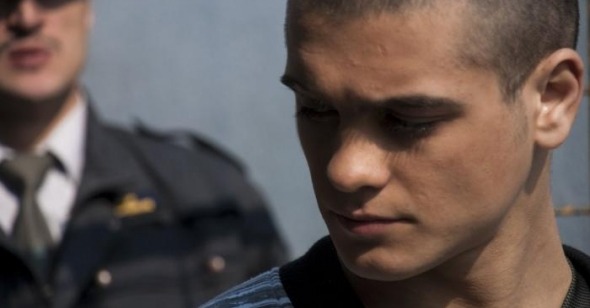Pen Pals
By Damon Smith
If I Want to Whistle, I Whistle
Dir. Florin Serban, Romania, Film Movement
In Florin Serban’s If I Want to Whistle, I Whistle, a charismatic, well-behaved teen inmate at a rural reformatory becomes a tightly wound bag of nerves when he receives troubling news from the broken-home front. Despite its carceral trappings, Serban’s film, driven by George Pistereanu’s raw, nervy lead performance, adheres to few prison house–film clichés. Winner of the Grand Prix Silver Bear and Alfred Bauer Prizes at last year’s Berlinale, Whistle is a sobering gut punch of Romanian realism, the kind of visceral, hard-knock drama that Jacques Audiard’s A Prophet aspired to be. Though the film lacks the complex, conscientious moral dimension of that French opus, and falters when its protagonist’s sudden, self-negating act of rebellion nearly sends the entire carriage off the rails, Serban’s stoic single-character focus has a riveting, almost hypnotic fascination all its own.
At a minimum-security work camp staffed by truncheon-wielding guards, delinquent Silviu (Pistereanu) cavorts with his pals, kissing one inmate on his shaven head and gamely tossing bales of hay while another serenades him with a song about burning down the jail. Called to an unexpected visit from his younger brother (Marian Bratu), Silviu learns that the mother who abandoned them years ago (Clara Voda) has returned and wants to take the boy with her to Italy. With paternal firmness, he makes his brother promise to stay put until he’s freed in two weeks. When his mother appears at the facility herself to argue her case (one of the film’s tensest real-time dramatic scenes), he unleashes his fury at her selfishness, then tries to negotiate an early release with the warden (Mihai Constantin). At this point, Pistereanu’s face becomes an unreadable mask of hard blinks and steely, onyx-eyed stares, suggesting coiled danger and unresolved wounds. Although the precise reasons for Silviu’s cage-rattling desperation aren’t immediately apparent (we only know he’s raised his brother alone, and that mom toted him around in between lovers, eventually leaving him on the streets), Serban sets up another conflict by introducing Ana (Ada Condeescu), a student interning as an in-house counselor who catches Silviu’s attention.
Of all the recent dramas that constitute the nominal “wave” of films by post-Ceauşescu generation filmmakers, Whistle, from a play by Andreea Valean, most resembles Cristian Mungiu’s 4 Months, 3 Weeks, and 2 Days, another film that prized white-knuckle tension from a situational dilemma about bodily imprisonment (the need for an illegal abortion). In that film, set in the Eighties, the authoritarian state was invisible yet omnipresent, a bogeyman that indirectly suffocated individual will and self-determination under the threat of harsh penalties, and even death. In Serban’s Romania (circa April 2009), the state is embodied quite literally (guards, a prison) and is not entirely indifferent to human needs (hence, an avuncular warden), but has morphed into a gormless and ineffective bureaucracy. Whistle is resolutely present-day in its concerns, a social portrait of those whose limited choices are the result of neglect or penury, both symptoms of a bad economic hangover. Though the desire for escape figures prominently in the film’s adrenalized final half hour, the emphasis is more on rebellion for its own sake, an instinctual fuck-you to a feeble reform system that promises neither renewed opportunity nor the cessation of suffering for juvenile offenders.
Any number of dramas could be singled out for inclusion in the jailhouse-film hall of fame, since the genre cuts cleanly across the commercial/art-house divide, from A Man Escaped to The Shawshank Redemption, serving any number of ethical, political, and philosophical purposes. The majority of them tend to emphasize human resilience and inner reformation. Most share an antiauthoritarian gene as well (does anyone sympathize with the institution or the screws?), and put the idea of “freedom” into play, usually in the form of escape, whether actual or psychological. Co-written with Catalin Mitulescu (How I Celebrated the End of the World), Serban’s film succeeds in its unromanticized depiction of Romania’s youth correctional system, the rhythms of the yard and showers captured in quasi-documentary detail by DP Marius Panduru (Police, Adjective) with the participation of actual inmates Serban vetted and trained for two months. But it’s Silviu’s story that draws us into that world with an intensity worthy of its bottlenecked protagonist, even if it mislays some of its authenticity and dramatic balance when it veers into hostage-crisis mode. In a sense, his decision to kidnap Ana, a fetish object who represents a normative life he cannot live, or believes has been denied him by circumstance or fate or bad parenting or just shitty luck, is an act of pure defiance. Freedom’s just another word for nothing left to lose.
